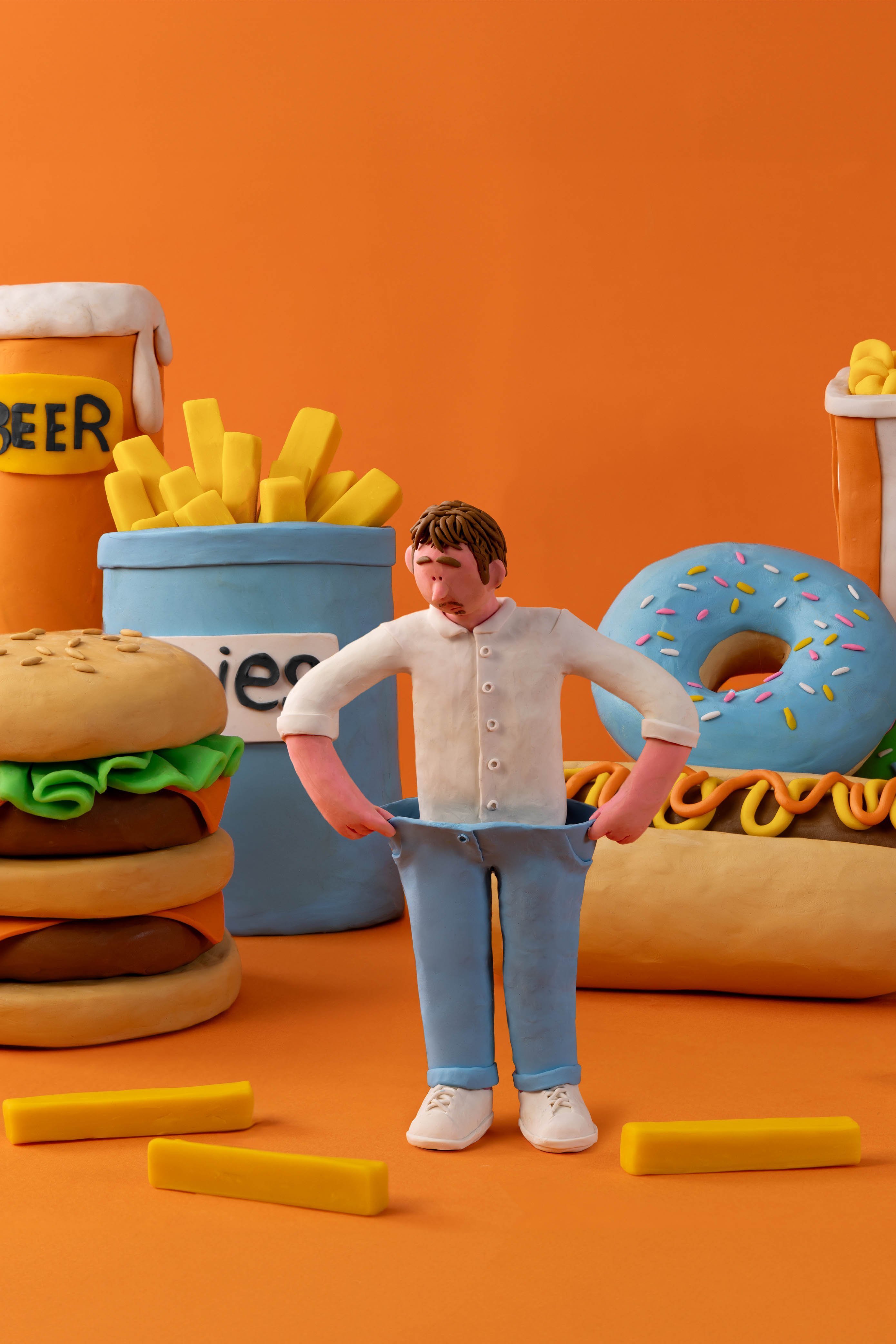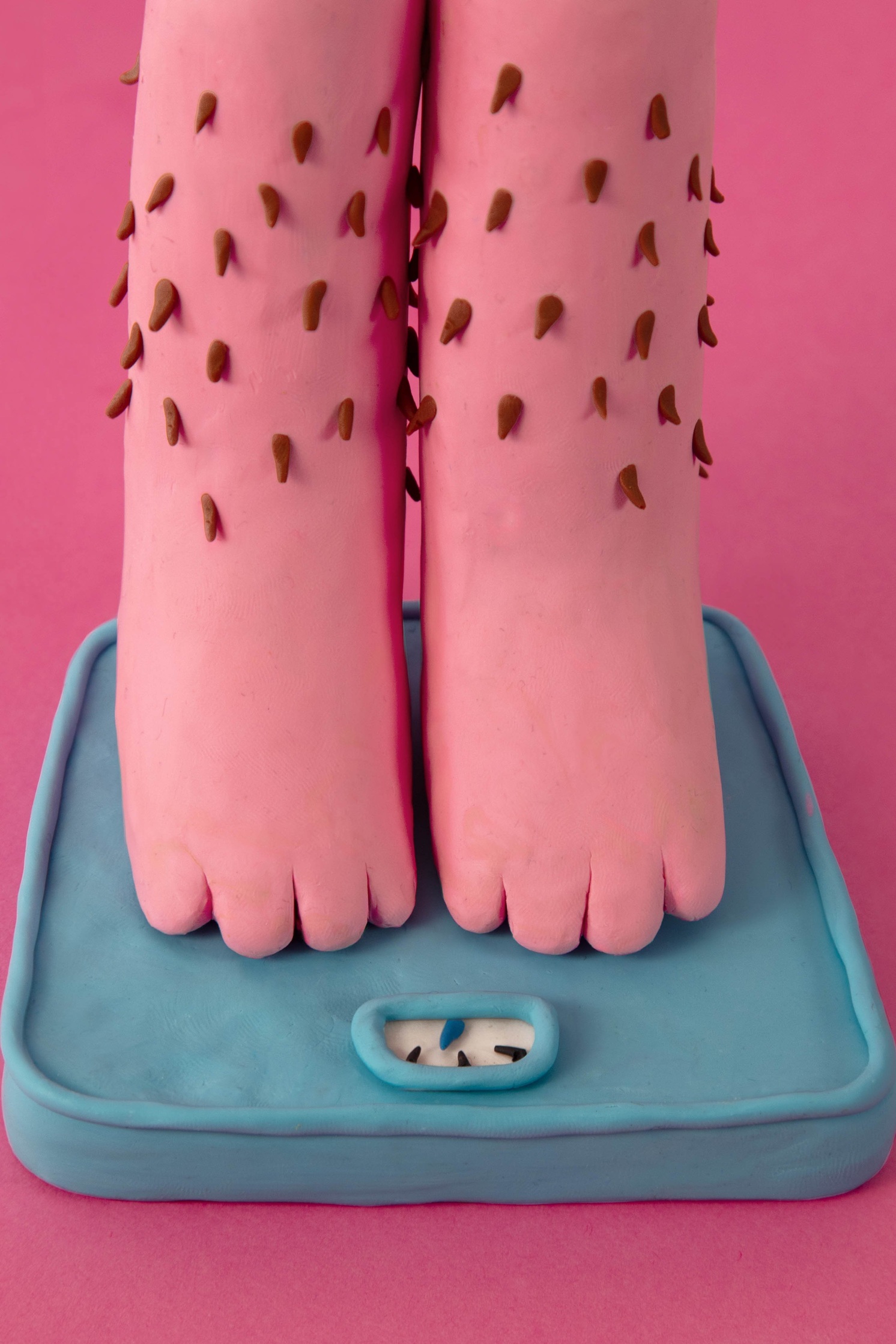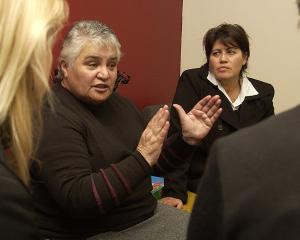
Well, I’m on Mounjaro. A few minutes ago I injected 2.5mg of it into my thigh, so it’s in there, doing whatever it is that it does.
It’s a curious feeling to inject yourself, just in your house — despite the 17-step guide it feels illicit, wrong, dark-web, like I shouldn’t be entrusted to do this to myself. It doesn’t get any easier, either: this is my 11th week on the drug, and despite how carefully I follow each instruction (wipe the top of the injector with a sterile swab; screw in the one-use needle; make sure there are no air bubbles; inject), and how much I tell myself out loud "This isn’t weird," it still is. I still have to take a small breath before the (slight, thin, short, delicate!) needle breaks the surface of my skin; I still feel squeamish when I take it out again; I still spend the day afterwards wondering if slithering feelings in my body are psychosomatic or not. I look at a faded patchwork of tiny green bruises along my thighs and think, wow, what an utterly dreadful heroin addict I would make.
And then I go to the kitchen and eat nothing.
I had never considered Mounjaro — the diabetes medicine-turned weight-loss drug in the same class as Ozempic — before January, when a friend offhandedly admitted he’d been taking it. I was surprised: he was slim and I wasn’t; he was a disciplined, regular runner and I was a chaotically erratic one; I stayed at his house once and all the porridge there was healthy, and the only real snacks were dried fruits and nuts. But he’d been on honeymoon in December, put on more weight than he’d like, then came back and started taking it after a friend of his had casually started doing the same.
That’s what has struck me about these drugs becoming readily available and then, almost instantly, widely used: how casual it all is. "It’s just an appetite suppressant," he said, and there was a calm, chilling logic to that: want to lose weight? Well then, just turn your appetite off with a drug. And there was another simple, primal, ludicrous context at play here: he wasn’t the first person I knew injecting himself to eat less, but he was the first straight man I knew who was doing it. I didn’t realise we were allowed to do that.
And I did want to lose weight. I’d wanted to for ages, lost a bit to start the year off, but wanted to lose more, and this felt like an effective, if drastic, way of doing that. Once I knew one person walking on the Mounjaro moon, it was easy to join them up there.
The next day I filled biographical details into a website recommended to me by a friend I had watched push a sandwich around a plate a few weeks earlier — "I’ve got a referral code — hold on". Two days later, a silver bag packed with an icepack arrived on my doorstep.
Important, of course, at this point to try to explain my way out of it: I had already made efforts to lose weight on my own. By the end of last year I was wincing when looking at photos people took of me. In January I made a concerted resolution to drop a set amount of weight, and over a month of careful eating and regular running and no drinking I moved the dial a satisfying amount. But my weight has always skittered out of my control as long as I’ve been alive: I was a pudgy kid who turned whippet-thin when I discovered "being very bad at football", and then playing too much football in the rain gave me a dose of pneumonia that led to me staying inside and turning pudgy again. Then at secondary school I discovered "sitting at a desktop computer looking at the internet" and got really quite out of shape, and then at university some unseen gear change in my metabolism resulted in my dropping all the weight without ever really trying.

I’m not the only one who has found their way to Mounjaro. And I apparently unwittingly personally know about half of everyone who has. The drug works by mimicking the hormones GLP-1 and GIP, which work to both suppress appetite and, through greater insulin production and sensitivity, reduce the rate at which food is emptied from the stomach (it makes your, ah ... you know. It makes visits to the bathroom very different in both frequency and consistency).
"It changes your personality," said a friend who a few months ago I had watched eat one spoonful of dessert and then push the plate away (I mull this over, look deep into my own soul, and decide that might not be such a bad thing).
Widespread Mounjaro use feels oddly at the apex of both "casual" and "drastic" — to inject a drug first developed to help Type 2 diabetics into your thigh once a week, altering your bowel movements quite significantly, just to lose pounds faster than dieting and exercise really would. There are, as well, risks: the side effects can veer into severe gastrointestinal issues and hypoglycaemia, to an increased risk of pancreatitis and gall bladder problems. The more you look into it, the more it seems like a really extreme thing to do, instead of just having a smaller breakfast for a while.
But then how much of what we do to change the shape of our bodies classifies as "extreme"? I am delighting in the gossipy feeling of telling everyone I meet that I am on it, constantly struck when every fifth or sixth person cheerfully replies, "Oh yeah, me too," and endlessly surprised by how many of those are men. Since we all turned about 17 years old my friends have been obsessed with talking to each other about their bodies through the context of the gym — how much they lift, how far they run, how fast they do it, what supplements they take, what injuries they have to overcome ("You should do this!" "You’re not taking that?"). It’s easy to point to the enormous social pressure women are under from approximately the day they are born to look a certain way, but there’s a background hum of that for men, too, one that has cranked up in the past 15 years as every actor became enormous for a Marvel role and every other person on Instagram started yelling at me about protein. We all follow huge personal trainers online and, at some point, have woken up and drunk salt water before eating. If you ever want to get a male group of strangers talking, just ask, "What creatine is everyone taking?" and watch them all go.
Injecting Mounjaro and pooing weird feels on the same spectrum as gym bros developing gynecomastia from taking steroids: we’re both craving a change in our body shape and we’ll both take a fairly embarrassing side effect if it gets us there quicker. The state of the modern male psyche is intrinsically linked to how their body looks in a T-shirt.
The first week is unerringly strange. Hours after the first injection I wonder if anything is happening while knowing, logically, that it can’t possibly yet. I search "first day on Mounjaro?" and learn from a forum that it takes eight to 72 hours to build up in your system (there are a lot of threads, in cheerily zealous my-life-has-changed tones, which talk about the miraculous absence of "food noise", how life feels so much freer and easier without it), but it doesn’t stop my mind racing away with the idea. I pull on a pair of trousers and suddenly expect to be thinner, for them to be looser, and slightly convince myself they are.
The next day at lunch I bite into a char siu bagel and suddenly it feels different in my mouth: like functional food, fuel. At the cinema I eat a hot dog and it tastes like texture. I still make food purchases based on my old appetite — a bag of those good supermarket cookies stays on the kitchen counter for days, and when has that ever happened? — and I sit in front of a basket of chicken tenders and just look at them, for minutes, before bothering to eat.
I keep losing track of my mood in the middle of the afternoon. I keep becoming hangry without the "h", because I haven’t noticed my own hunger. I have to learn to eat with my brain, instead of my body; to force myself to start my day with a bowl of porridge and a banana, so I have enough fuel to think beyond coffee. I keep having to buy protein bars on the go, because my mood is swinging. It’s easier to convince myself to go running, harder to talk myself into a beer. My mouth is always dry. I step on the scales every morning and the number keeps getting steadily smaller and it’s good, yes, and it’s what I wanted, but also I haven’t thought about my weight this much in my life.

I get my first "You’re looking well" in years and I feel like I’m beaming, but also a not insignificant part of me feels like I’m "cheating". A friend messages the groupchat telling us how he hit his goal weight with a rejuvenated diet and exercise. It feels more honest, more earned. I bump into fellow travellers and we both look well and pick at chips, together. A friend tells me everyone he works with is on it and then we both forget to eat for the next eight hours.
This, I think, is how a lot of people just live, I’ll say to anyone who’ll listen as I walk around marvelling at my new-found ability to just get a coffee without also getting a little treat.
As with anyone who has had the distant ambition to lose weight for a while now, I follow a number of Instagram fitness influencers and have hundreds of saved reels with diet advice, and the straightforwardness of it always ignores the sheer reality of appetite. "If you want to lose weight, start your day with this ..." someone who has never had a whole pizza to themselves says to the camera, holding something deranged made with protein powder, and though that might work for a day or two, for me the lure of food with cheese melted on top is always in the background ready to pounce. Losing the kind of weight I am trying to lose takes months of sustained discipline, and even with the Mounjaro it’s coming off slowly. Any diet advice that ignores the gnawing voice of hunger only works for those who can’t hear it.
The email comes asking if I want to increase my dose and I say no: I like the low hum of "no hunger" and don’t want to turn it up to "nausea", like everyone warns me the higher dose will do; I still like going out to lunch and being able to finish it; I am running more often and want to be able to consume the fuel I need to do that. The weight starts melting away from my face and my limbs get slimmer. My clothes fit better and I start looking in the mirror more. I catch myself in the golden hour looking especially sexy and take the first selfie I’m happy with in maybe ... three years. But I can’t shift the feeling that I’ve not lost weight, but weight loss has happened to me.
It seems like this sentiment is shared by the more honest eat-less-and-move-more lifestyle-havers I know. When I am at the pub gleefully telling everyone I’m down almost 10kg for the year, I’m met with a humbling, "Well yeah, obviously". A friend who last year pulled me aside and told me, kindly but firmly, that it was time for me to take my health more seriously seems unmoved by the fact that I have.
If it’s not good if I’m overweight and it’s not good that I lose weight, but in the "wrong" way, then what is good? I sort of get it, too: it’s false valour. "It feels like I’ve cheated at an exam," says the friend who gave me the referral code. "I don’t feel like I’ve earned anything."
For years I have glazed over in conversations where friends have talked about the gym, personal bests they’ve recorded, weights they’ve lifted, new T-shirts they’ve had to buy that they can pull over their biceps. You hit your 30s and all the men you know are suddenly training for a marathon and you wonder why your own body can’t run 26.2 miles on a whim.
But I think the hollowness of this weight loss is also attached to the same machismo that drives those gains: some part of the male brain delights in turning their body into an effective tool of physical prowess with holy discipline, the refusal of temptation, early mornings and those hard workouts when you’re not in the mood (it also probably helps that my peers and I are at an age where we’ve just had a dreadful clunking realisation about our lifelong health — it was good being young but that 2012 Olympic summer was a very long time ago now). Getting results with a needle ... listen, it was cool when Neo downloaded kung-fu. But wouldn’t it have been cooler if he did it properly? If he did it himself?
This is where I ultimately am with Mounjaro, as I pick which thigh gets a little green bruise this week (left). I feel and look better than I did at the start of the year, but I did it in a way that feels like playing Grand Theft Auto with the cheats on, so it barely even counts. I’m happier now with how I look than I’ve been in years, but still constantly nagged with the feeling that I’ve done it "wrong". Perhaps, when the way I use the bathroom goes back to normal I should go to the gym instead. It feels more honest and, crucially, it means I can finally join in with the boys with all the boring talk about gains.— The Observer












